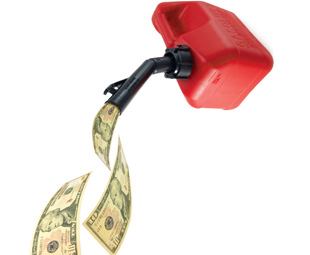When the price goes up

The rising price of fuel is spurring transport companies to hedge oil exposure, here’s how it works.
With 88 barrels sold a day, crude oil is the most consumed commodity in the world. South Africa is largely dependent on fuel imports and spends about $400 billion (R3,72 trillion) annually on crude oil which is used to produce diesel, petrol and jet fuel. “Crude oil is consequently the most actively traded commodity in the world,” says Gerhard Labuschagne, trader for trading company BVG.
Due to long transport distances, fuel expenses in South Africa can make up a significant percentage of the local cost of doing business and having the means to effect fuel savings can be a critical element to consider.
The huge impact of the rising price of fuel on local transport companies has encouraged growth in oil commodity hedging and investing strategies locally. According to Labuschagne, the rising cost of doing business as a result of fuel increases impacts everyone from transport companies and retail chains to farmers.
The oil price is based on two global benchmarks; Brent from the North Sea and the West Texas Intermediate (WTI) from the United States of America. According to Labuschagne, these two benchmarks used to trade close together but over the past two years a gap has opened up between them. This is because the older Brent oil fields require more costly maintenance, while the newer WTI fields experienced a glut after shale oil was discovered there. This gap grew to $26 (R242) a barrel in January this year.
Since late 2009, the Johannesburg Stock Exchange (JSE) has offered exposure to the world’s volatile crude oil market through a licensing agreement with the CME Group, by providing exposure to light sweet WTI crude oil. Consequently, while Brent is commonly assumed to be the global benchmark for crude oil, WTI is substantially more variable.
Companies with large exposure to the price of diesel, for example, can use both oil options and futures contracts to better manage their fuel exposure. Participants are able to achieve international exposure in rand terms through a local JSE-authorised derivatives member firm.
To date over 5 700 contracts have traded, each representing 100 barrels of crude oil. Open interest, which reflects the number of open positions held by buyers and sellers, is about 5,6 million litres currently.
The JSE’s director of commodity derivatives, Chris Sturgess comments: “Certain businesses are exposed to the price volatility of the crude oil market. These companies could turn to the market to better manage their price risk. While speculative trading opportunities exist, the core purpose of a derivatives market is to provide underlying market participants with an opportunity to hedge their crude oil exposure.”
Any drop in price to $80 (R744) a barrel or below would be a good time for transport companies to lock in lower prices through oil options or futures, according
to Labuschagne.
This can be done through the JSE’s Commodity Derivatives market, which allows trading in both oil options and futures contracts. Companies with large diesel fuel bills, for example, can
use these instruments to better control their costs.
Sturgess says companies overseas make use of WTI as a way to hedge their fuel costs. “We are seeing a steady rise in demand for WTI futures and options in the South African market from people who want to protect themselves against uncertainty in the energy market. As we have seen over the last two years, there is huge volatility in oil prices and some analysts believe WTI will again rise above $100 (R931) a barrel in the foreseeable future, as Brent is already currently trading at $110 (R1 024).”
How to hedge oil commodities
An option gives the right (but not an obligation) to buy or sell oil at a price (known as the strike price) that is fixed today. Labuschagne says a company can hedge itself against rising diesel prices by buying a call option (which gives the company the right to buy oil in the future at a price fixed today).
“There is a high correlation between oil and diesel prices. If oil prices go up you can, with a large amount of certainty, assume diesel will go up too. If that happens, the value of the call option goes up. You can then sell the call option at the higher price later on. If oil prices rise above the strike price of your option, the company gets the difference between strike and current spot price.
“If oil prices go down, diesel prices should go down too. In this case the company would only forfeit the option premium paid. Large consumers of oil should treat options as a form of insurance against excessive price increases, and not as a way to make additional profits,” he says.
Oil futures are different in that roughly 10 percent of the value of the oil contract is paid to the South African Futures Exchange (Safex) as a good faith deposit (or initial margin) which will be returned with interest when the position is closed. Prices are adjusted daily (known as marked-to-market) based on the underlying trading activity and any profit or loss on the contract is credited or debited to the trader (this is referred to as variation margin).
If a trader buys an oil futures contract in the expectation that prices will rise, any increase in the contract value is credited to his account.
Should oil prices fall, however, the trader’s account will be debited with the difference and if prices keep on falling – he will have to continue depositing variation margin which is passed onto the counterparty of the trade.
The trader is, therefore, potentially exposed to large variation margin calls if the open position is not actively managed and protected with a stop loss. An option has advantages over futures in that the buyer’s risk is limited to the size of the premium paid. Labuschagne says large consumers of diesel, such as transport companies, traditionally negotiate bulk discounts from the oil suppliers, but this does not protect them against rising oil prices.
“So, while you might be able to negotiate a five percent bulk discount from the diesel supplier, if diesel prices rise by 20 percent over the next six months, you will still be paying 20 percent more for you diesel, regardless of the bulk discount.
“Contracts on Safex are rand denominated, so you get protection against oil price rising and the rand weakening,” says Labuschagne.
“The WTI price for a barrel is currently about R860. We do hedging off the rand value of diesel consumed. Therefore if a company is spending R1 million per month on diesel, the Basic Fuel Price (BFP) component is about 70 percent.”
“We will hedge R700 000 worth of diesel by trading WTI. At R860 per barrel, that is equivalent to 814 barrels or approximately eight contracts representing 100 barrels each. It is important to note that one does not hedge the entire fuel bill, but only the BFP component as one cannot hedge taxes and levies.”
“Let’s assume the company wants to cap its diesel price (using WTI oil as a proxy) at R880 a barrel (current June price). The option premium for 100 barrels, for a June 2013 contract at the money call for R880 per barrel, will cost about R36, which is slightly more than four percent of the cost of a barrel. The option cost goes down if the company is happy to absorb some of the risk, and buys a call option with a strike price further away from current market prices.
If the company is happy to cap its price at R940 a barrel, the option premium price drops to about R17 a barrel. If the company ventures even further “out of the money” by fixing a strike price of say R1 000 a barrel, the premium price drops to around R5,50, which is less than
0,6 percent of the cost of a barrel.”
Labuschagne concludes that while the premium costs may seem high, oil options should be seen as a way of protecting against fuel spikes and with the current exchange rate, we will be looking at diesel prices beyond R15 a litre if WTI moves back to $140 (R1 303) a barrel.
Rand/dollar conversions have been made using an exchange rate of R9,31 as at April 22, 2013.
Published by
Focus on Transport
focusmagsa





 FUSO: Driving the Future of Mobile Healthc
FUSO: Driving the Future of Mobile Healthc



 New Electric Van Range Unveiled!
New Electric Van Range Unveiled!  A brand
A brand




 Wondering about the maximum legal load for a
Wondering about the maximum legal load for a 
 The MAN hTGX powered by a hydrogen combus
The MAN hTGX powered by a hydrogen combus


 Exciting News for South African Operators
Exciting News for South African Operators






